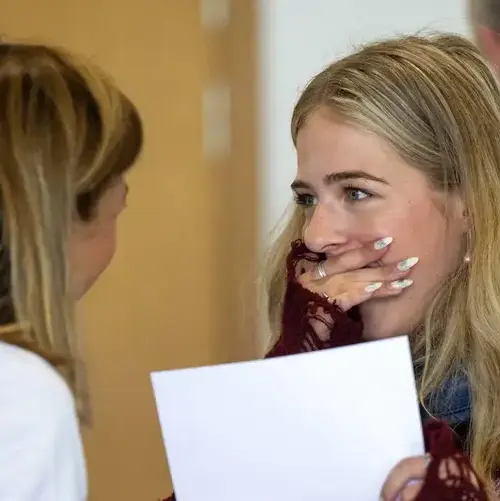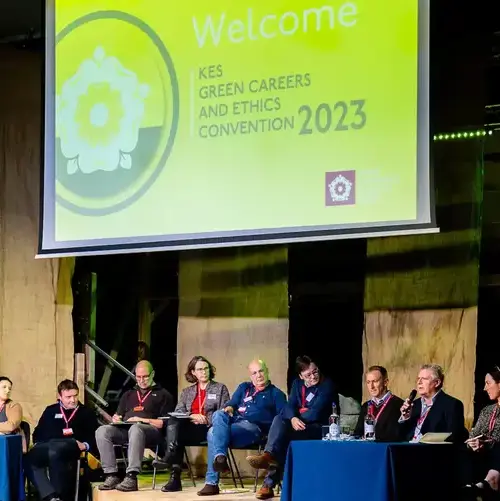 Academic Life
Academic Life
A Level study gives pupils the chance to select the subjects that they are interested in and to develop these interests in real depth.
Inspiring teachers, smaller classes and an increased maturity and motivation mean that sixth form lessons take place in a stimulating, enjoyable and increasingly collaborative learning environment. Pupils develop a thirst for knowledge and intellectual challenge and become increasingly independent in their learning. Developing this sense of independence and self-motivation during the Sixth Form is excellent preparation for heading off to university or college within just a couple of years.
There are around 30 subjects on offer in the Sixth Form, with almost any combination possible. Although there are many different factors to take into account when selecting which subjects to choose, enjoyment and likelihood of success will inevitably rank high amongst the considerations.
a level results & destinations 2024
 |
YEARS 12 AND 13 CURRICULUMThe current usual pattern of advanced study is to take four subjects in Year 12 (five, if studying Further Maths), to which will be added Learning for Life/Careers and Higher Education & UCAS guidance, and Games or Community Service. Although a good number of pupils continue with all of their subjects into Year 13, it is more usual to reduce to three (or four, if studying Further Maths) for the final year of A Level study. Subjects are chosen according to a choice scheme, which permits most combinations. We also offer the Extended Project Qualification (EPQ), which allows in depth research into a topic of their choice, demonstrating independent learning. |
SUBJECTs we offer
| Art and Photography |
|---|
A LEVELStudying Art or Photography, or even both at A Level, gives pupils the opportunity to work in a stimulating and exciting environment, where they are encouraged to develop a variety of practical skills and approaches. At the start of both courses, the emphasis is placed on learning and developing new skills and techniques. We explore a range of themes during the first term of Year 12 and deliver a variety of workshop-based lessons that encourage playful experimentation and the creative development of ideas. As the courses progress, pupils are given the opportunity to explore their own interests and create a ‘personal project’ around a theme of their own choice. Throughout the Art and Photography A Levels, pupils are required to explore and investigate the work of other artists, photographers and designers and to broaden their understanding and appreciation of traditional and contemporary work. Pupils choosing A Level Art or Photography develop as self-motivated, communicative individuals, willing to extend themselves in an imaginative and skilful manner. We foster links with Art Schools and help to prepare pupils with their portfolios for interview at Foundation Course level, the traditional route into art courses, and increasingly we prepare pupils for direct entry at degree level in Art and Photography, Art History, Architecture and Fashion/Textiles. |
| BIOLOGY |
A LEVELBiology at A Level gives pupils the opportunity to widen and extend their knowledge and understanding, covering a range of topics, starting with basic biochemistry, cells and physiology, and working towards a detailed study of the way that cells and organisms are controlled by their DNA and nervous systems. Modern techniques of PCR, gel electrophoresis, DNA fingerprinting, epigenetics, stem cell research are all covered as pupils develop a clear understanding of the role of Biology in modern society. Emphasis is given to investigative work; pupils do numerous different investigations to the gain practical endorsement and a wider appreciation of practical work in Biology. These include dissections, serial dilutions, chromatography, choice chambers and many more. Visits to a DNA workshop at We The Curious in Bristol and a residential field course, provides the pupils with the opportunity and resources to widen and further develop investigative skills beyond the classroom. Many pupils regularly go on to study Biology related degrees at university ranging from medicine and dentistry to pharmacology and botany. |
| BUSINESS STUDIES |
A LEVELBusiness Studies uses real life business examples to hang theory and models from to generate learning of the subject. To aid this we have links with a number of Bath-based SMEs who are happy to share their enthusiasm for business with our Sixth Form pupils. The course aim is to get pupils to see business as a dynamic whole with each component function impacting upon another. The course is case study based and pupils will be expected to explain and recommend suitable strategies that a business might take as well as backing up their solutions with theory and numerical data. |
| CHEMISTRY |
A LEVELChemistry in the Sixth Form is very popular and, in recent years, demand for the subject has grown significantly. The course is divided into the traditional pillars of Physical, Inorganic and Organic Chemistry, together with a healthy dose of investigative and practical chemistry with tasks that range from making their own aspirin to identifying unknown compounds. The Year 13 course is a more advanced treatment of the ideas studied in Year 12, but good mathematical skills become more important as pupils begin to draw quantitative conclusions in their work as opposed to the more qualitative ones required in the early part of the course. More and more pupils are pursuing their enjoyment of the subject beyond A Level study. Chemistry, together with its interrelated disciplines e.g., Natural Sciences, Biochemistry, Medicinal Chemistry and Materials Science, are popular undergraduate degree choices for pupils at King Edward’s. |
| CLASSICS (CLASSICAL CIVILISATION, CLASSICAL GREEK & LATIN) |
A LEVELBoth Latin and Greek are offered at A Level, with the focus remaining equally divided between literature and language. Language lessons aim to provide more in-depth analysis of vocabulary, word endings and sentence structure and will now include prose composition alongside grammar sentences and unseen translations. Literature lessons involve a more holistic approach, reading texts in more detail, with further awareness of the background society and the author’s own background. Prose authors will be read for both years of the A Level course, whilst we read two verse authors over the two years. We feel incredibly privileged to be one of the only schools in the South-West of England to consistently offer three Classical subjects at A Level. Our students are intelligent, vibrant and utterly committed, leading to outstanding results across the board. We have had thirty pupils go on to study Classics or related degrees at university in the last decade, including Oxbridge offers in the last eight consecutive years. As the school edges ever closer to celebrating its 500th anniversary, it is so heartening to know that the Classics still play such an integral part in the curriculum as they did at its foundation. |
| COMPUTer science |
A LEVELAt A Level, the programming element of the subject takes centre stage with pupils learning such skills as Object Oriented programming, Big Data and Functional programming. There are modules that teach abstract data structures, pathfinding algorithms and theoretical computing. The GCSE topics of computer architecture and networking are revisited in greater detail. The course is completed with an in-depth programming project of the pupil’s own choosing which is worth 20% of the final A Level grade. |
| economics |
A LEVELEconomics at A Level is an academic exam-based course. Economics covers the theory behind explaining what economic data is telling us and how to understand news reports about domestic and international economic decisions. In this course, pupils learn about both micro/macro-economics, but the department recognizes that, whilst these are discrete components, Economics is still just one subject and should be treated as such. The course develops many skills that will be useful in later life as pupils will be analysing economic data, recommending solutions that Governments might undertake and explaining current events and issues using theory. |
| ELECTRONICS (A ONE-YEAR COURSE OFFERED AT AS LEVEL ONLY) |
|
The Physics department offers an AS Level in Electronics. This is very much a practically based course and follows the EDUQAS specification. The three main topic areas studied are: digital electronics, analogue electronics and microprocessors, including programming. This is a popular choice with pupils studying Computing and/or Physics. |
| ENGLISH LANGUAGE |
A LEVELThe Eduqas A Level in English Language focuses on the ways in which we use language, for what purposes and with what effects. It explores such questions as ‘How do children learn to speak?’, ‘What did English look or sound like several hundred years ago?’, ‘Why do men and women speak differently’, and ‘why does the same person’s speech change so markedly according to whom they are speaking?’. This course looks at written and spoken language now as well as how English has arrived in its current form and allows students to pursue independently their own areas of interest when investigating how identity is shaped by language choice in print. It also allows students to write creatively and explore the ever-changing world of modern communication, bringing their own experience of day-to-day interactions with friends and family into the classroom. |
| ENGLISH LITERATURE |
| The OCR English Literature A Level course studies some of the most challenging texts by some of the world’s most well-known authors. There is a great breadth to the course: we encounter classic texts from the fourteenth to the nineteenth century, such as work by Chaucer, Shakespeare, Webster and Tennyson, as well as more modern works by writers from TS Eliot to William Faulkner, and Edith Wharton to Harold Pinter. The coursework unit also allows for consideration of contemporary texts, such as the poetry of Tracy K Smith or the novels of Sebastian Barry and Ali Smith. Our study allows us to spend time really examining these texts as products of their time and through the lens of other readers, as well as being works of art in their own right. Texts are often explored comparatively, allowing pupils to develop their ability to draw connections and explore contrasts across genres and time periods, whilst there is also the opportunity to hone close reading skills by focusing on individual texts. |
| EXTENDED PROJECT QUALIFICATION |
|
The OCR Level 3 EPQ is offered as a self-led additional qualification for motivated pupils. This course is a test of independence and self-motivation and, as such, help and guidance are given with topic choice, project management, and submission but all of the work is done off-timetable and without formal lessons. This qualification offers pupils an opportunity to learn about project management, a vital component of ‘post school’ life and of particular relevance to Further Education, Higher Education, and the workplace. Each pupil is able to tailor their project to fit their individual needs, choices and aspirations and will be assessed on four areas:
The outcome of the project can be a design, performance, report, dissertation or artefact. Whatever form this takes, the project must include a written component. Generic skills can also be developed and applied through the Extended Project; pupils will have the opportunity to apply and develop their personal learning and thinking skills (PLTS), the functional skills of English, Mathematics and Information and Communication Technology (ICT) and key skills. An EPQ can greatly enhance a pupil’s university application, especially in areas that are not as well covered by standard A Level subjects. |
| GEOGRAPHY (HUMAN & PHYSICAL) |
A LEVELGeography is popular at A Level where we follow the OCR specification. The A Level is relevant to many of the issues faced by societies. Climate change is considered with a thorough understanding of the water and carbon cycles, whilst the dynamism and identity of places is investigated. The A Level is a lovely blend of geographical theories and skills which are linked to detailed case studies such as the diffusion of diseases at different scales. the ability of countries to deliver basic human rights, the importance and implications of global migration and how the water and carbon cycles differ throughout the world and how they are changing. Systems, globalisation, interdependence and identity are at the heart of this fascinating and topical course. |
| GOVERNMENT & POLITICS |
A LEVELWe study the AQA Politics course. In Paper 1, we study the UK. The course is broken down into Government – the building blocks of understanding how the constitution, government, Parliament, and the judiciary works, and Politics – understanding how democracy operates, different electoral systems, the role of pressure groups and the media, and the shifting shapes of the political parties. In Paper 2, we study the US. This follows a similar pattern to the UK, but the focus is comparative, ie pupils are encouraged at every turn to contrast, say, the advantages and drawbacks of the US’s codified and entrenched constitution with the UK’s system of Parliamentary Sovereignty, or to ask whether the UK Conservative Party’s courting of working-class voters in the 2019 election mirrored the Republicans’ victories in the Rust Belt in 2016. In Paper 3, we look at Political Ideologies. Liberalism, Conservatism, Socialism, and Feminism are studied from both an historic and contemporary perspective. Assessment is via three exams, with a mixture of medium-length, source, and essay questions. |
| HISTORY |
A LEVELAround 30 pupils study History at A Level. The skills that History teaches are as in-demand as ever. At a time when politicians promise simple solutions to complex problems, when social media creates echo chambers, and when people with unappetising views are cancelled rather than debated, the twin skills of sober analysis of evidence followed by reasoned evaluation of which side of the argument to come down on are priceless. The skills our A Level pupils are taught - in reading, writing, listening, debating, presenting, and persuading – are fully future-proof in the face of AI and can be applied to a wide range of careers, from banking and law to policymaking and business. In Unit 1, we study the 17th Century in Britain: why did we chop the head off the King in 1649, only to restore the monarchy eleven years later? And why was there another, arguably more permanent, revolution 28 years after that? With religious fanaticism, political intolerance, and seismic developments in science, industry, economy, and philosophy, the 17th Century shares some eerie parallels with our times. In Unit 2, we ask how the last absolute monarchy in Europe withered away in Russia. Was it inevitable? What missteps did the Tsarist regime make? How did a small minority of Bolsheviks manage to seize, and retain, power? The story of Russia in the period 1905-1924 explains much about the country’s current dysfunction. In Unit 3, we chart the story of Civil Rights and Race Relations in the USA from 1861-2009. This sweeping survey course makes use of literature and film to support its charting of the African American journey. From the horrors of slavery and the hollowness of emancipation to the energy of the civil rights movement and the optimism of the Obama presidency, this course provides a highly engaging study of a people showing great dignity in the face of repeated setbacks. For Coursework, students study an aspect of the Holocaust. This is an independent, 4,000-word essay worth 20% of the overall grade. Popular questions include who else, aside from Hitler, can bear responsibility for genocide and the extent to which the Holocaust was a long-term plan. Assessment for Units 1-3 is via a mixture of essays and responses to source material. |
| LEARNING FOR LIFE |
|
Our Sixth Form Learning for Life programme supports pupils in their transition into adulthood by preparing them as thoroughly and pragmatically as possible for life at university and beyond. It is further enhanced by external partnerships with organisations including It Happens Education, The Daniel Spargo-Mabbs Foundation and Digital Awareness UK who offer specialist workshops, talks and discussion groups. This opportunity for pupils to hear personal stories and anecdotes from people with different perspectives and experiences is invaluable in helping relate what they learn to real life.
|
| MATHEMATICS (& FURTHER) |
A LEVELMaths has been the most popular A Level choice at King Edward’s for some time, with around 75 pupils electing to study either Single Maths or Further. Pupils work towards the Edexcel A Level for Mathematics and around 30 of these pupils also take a second A Level in Further Mathematics. With such healthy numbers, we are fortunate enough to be able to have two Further Mathematic classes, who are taught completely separately from the 3 or 4 single Maths classes. We are enormously proud of the results that our pupils have achieved over the years, with usually well above 30% of our grades at A* and 75% at A*- A. A number of pupils each year take one of the many university admissions tests such as STEP, MAT, PAT and TMUA and we often use questions from these papers to provide material for our weekly after-school Sixth Form extension sessions. |
| MUSIC |
A LEVELThis highly fulfilling course provides the essential stepping stone for many of our able musicians to continue onto their chosen journeys into top universities and jobs. It is true that you can still study Medicine with a Music A Level, and you don’t need to be considering life as a performer to be able to utilise the skills learnt in the course and access the £94 billion UK creative arts industry! Creativity, discipline, organisation, aural awareness, presentation skills, critical analysis, essay writing skills and logical reasoning are all key elements that are tested in the EDUQAS Music A Level course. Composition and the application of traditional harmony is led by our very own and widely recognised composer in residence, Mr Mark Boden, and over the past few years, pupils have had their compositions realised by KES ensembles in public concerts in exciting venues in Bath! |
| MODERN FOREIGN LANGUAGES (GERMAN, FRENCH & SPANISH) |
A LEVELModern Languages are an increasingly important tool in the global 21st century. Competition for jobs often means that applicants with additional skills are advantaged. Linguists are considered as possessing all-round capabilities, have confidence in communicating and have well-trained, logical minds. If someone has spent time abroad, they have a wider cultural awareness, can show proof of enquiring minds and a willingness to take on a challenge. Hence excellent opportunities exist for competent linguists, both those who have specialised in the study of languages to a high level and those who can combine them with other subjects. All Sixth Form pupils studying a language and King Edward’s study the Eduqas syllabus, which is a two-year, A Level course. Pupils are examined with three exam papers:
As part of their study, pupils will also study a novel or play, as well as a film, chosen from a prescribed list. These works are studied in the target language and pupils write approximately 300 words in their target language about each cultural topic. As well as preparing them for university, this syllabus teaches pupils to communicate confidently in their target language whilst demonstrating a good knowledge of grammar and vocabulary as well as contemporary issues related to the countries and communities in which their target language is spoken. |
| PHILOSOPHY |
A LEVELThe A Level Philosophy course is designed to develop a range of transferable skills which can be applied far beyond the study of Philosophy. It gives pupils a thorough grounding in key philosophical concepts, themes, texts and techniques as well as enabling them to develop the ability to reason, form their own judgements, express themselves coherently and contribute to the process of debate. These skills are developed by focusing on the major philosophical areas of Epistemology, Philosophy of Religion, Ethics and Moral Philosophy, and Philosophy of Mind. |
| PHYSICAL EDUCATION |
A LEVELAre you interested in anatomy and physiology, biomechanics, sports psychology, nutrition, skill acquisition and sports commercialisation? A Level Physical Education will give you a fantastic insight into the world of sports performance. You will learn why some people outperform others, mentally and physically, and delve into the ethical considerations behind the use of drugs and the influence that modern technology is having on sport. You will find this course enjoyable, whether you aspire of working in the sport sector or are keen to follow your passion for sport. You will develop a set of transferable skills including communication, decision-making, psychological understanding of people, independent thinking, coping with pressure, problem-solving and analytical skills. All of which are key skills in preparing you for a future career. We follow the AQA specification. Theory covers 70% of the course, examining factors affecting participation in physical activity and sport and factors affecting optimal performance in physical activity and sport. The Non-Examined Assessment (30%) is focussed on one sport and there is a written piece of coursework. |
| PHYSICS |
A LEVELAt A Level our pupils study the OCR Physics A specification. This is a holistic course, covering a wide range of topics, including topics like Astrophysics and Medical Physics which might only be optional under a different exam board. In the first year of the course pupils' study many of the topics they will be familiar with from GCSE Physics, such as Forces and Motion, Materials, Electrical Circuits and Waves, as well as some topics they are less familiar with, such as Quantum Physics. In the second year of the course pupils build on and extend their understanding, studying Thermal Physics, Circular Motion, Simple Harmonic Motion, Capacitors, Nuclear and Particle Physics, Astrophysics and Medical Imaging, as well as Gravitational, Electric and Magnetic Fields. In addition to studying key theories, pupils undertake a wide range of experiments. In these practical sessions, pupils need to demonstrate competency in a variety of practical skills as part of their practical endorsement, although their performance on the practical work does not affect their A Level grade. The course is an ideal preparation for further study at university, whether students are seeking to pursue courses and careers in physics, science, engineering, medicine or computer science or just interested in developing transferable problem-solving skills and a keen interest in popular science. |
| PRODUCT DESIGN (DT) |
A LEVELAQA A Level Product Design course encourages a user-centred approach to design thinking, with a focus on risk-taking and problem-solving. The course covers technical principles and designing and making principles and is divided into two halves. During the first half, there is a focus on more independent projects that extend knowledge and understanding of the designing and manufacturing skills, preparing pupils for their Non-Examined Assessment. The second half of the course focuses on the Non-Examined Assessment, and pupils are required to submit a substantial design and make project as well as a design portfolio. |
| PSYCHOLOGY |
A LEVELPupils study a variety of psychology topics, many linked to current affairs and mental health. Analytical and evaluation skills are developed throughout the course. Topics include investigating classic research, such as that of Milgram & Zimbardo, Biopsychology, Approaches and Research Methods. Issues and Debates, Schizophrenia, Cognition and Development, and Forensic Psychology are studied in the second year. During the course pupils will carry out a range of small-scale investigations which will enable them to apply ethical guidelines and develop an understanding of the strengths and weaknesses of different research methodologies. |
| RELIGIOUS STUDIES |
A LEVELA Level Religious Studies deals with the most difficult and significant questions human beings ask such as ‘Is there a God?’, ‘What happens when we die?’ and ‘How can anyone take religion seriously when there is so much suffering in the world?’ The study of the New Testament is a challenging analysis of a text which forms the basis for all credal statements within the Church. Typical areas of study include considering who Jesus was and why he was crucified. The study of Religious Ethics incorporates the study of ethical theories, the application of ethical theories to issues of importance, ethical language, deontology, and virtue ethics. During the course, pupils will engage with issues such as medical ethics and issues of life and death. |
| THEATRE STUDIES |
A LEVELThe EDUQAS A Level for Theatre Studies is a dynamic, challenging and exciting course. Offering a wide-ranging exploration of significant theatre companies and practitioners, such as Kneehigh and Frantic Assembly, alongside the study of a broad spectrum of texts, ranging from classical scripts such as Trojan Women to more contemporary plays such as Chimerica by Lucy Kirkwood. This course gives our pupils an extremely broad range of theatrical understanding and experience. Extensive exploration allows pupils to appreciate all aspects of theatre including performance, direction, design and critical review. Numerous trips to watch professional productions and visiting practitioners all support our pupil’s growth into independent creative performers and creators. Two in-house theatre technicians are on hand to support any technical or design pupils who wish to explore these elements as part of their A Level. Many of our pupils go on to study Theatre Studies or Drama at University and it is a delight to see many of them working in the production and media industry. |
 Learning Support AT KES
Learning Support AT KES
All teachers at the Senior School and Sixth Form work together to ensure that the right support (including access arrangements in examinations, where appropriate) is in place to enable pupils to achieve their potential.
In addition to the general support on offer, adjustments may be made to the curriculum to support pupils with specific needs. Typically, these involve minor adjustments within lessons and form part of the day-to-day educational provision, but some pupils also receive individual Learning Support lessons, delivered by a qualified teacher, and/or an adjustment to their timetable.
Individual Pupil Profiles are shared with teachers to ensure that appropriate strategies and information are in place to support the pupils, who are also encouraged to take greater ownership of their own learning journey.
Teachers work closely with the SENCO to ensure that pupils with additional learning needs are identified and appropriately supported, and any pupil who may be eligible for access arrangements at GCSE or A Level is considered for these in line with the relevant examination board regulations and application process.
Members of the Learning Support team are always available to offer help and guidance to Senior School pupils, including our Sixth Formers. They can have timetabled lessons to support their learning or simply book one-off sessions for advice regarding a particular issue, including opportunities beyond KES in Higher Education and Careers.
We hope that these learning support pathways will enable all our pupils at the Senior School and Sixth Form to thrive and to leave KES with the confidence to flourish in the future.


















